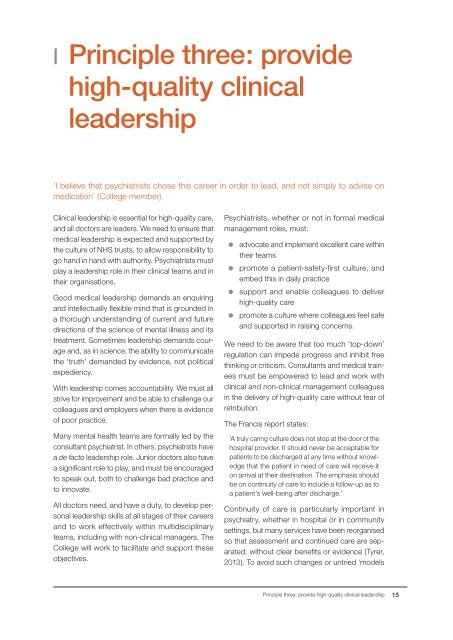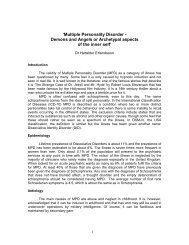Driving quality implementation in the context of the Francis report
Driving quality implementation in the context of the Francis report
Driving quality implementation in the context of the Francis report
You also want an ePaper? Increase the reach of your titles
YUMPU automatically turns print PDFs into web optimized ePapers that Google loves.
| | Pr<strong>in</strong>ciple three: provide<br />
high-<strong>quality</strong> cl<strong>in</strong>ical<br />
leadership<br />
‘I believe that psychiatrists chose this career <strong>in</strong> order to lead, and not simply to advise on<br />
medication’ (College member).<br />
Cl<strong>in</strong>ical leadership is essential for high-<strong>quality</strong> care,<br />
and all doctors are leaders. We need to ensure that<br />
medical leadership is expected and supported by<br />
<strong>the</strong> culture <strong>of</strong> NHS trusts, to allow responsibility to<br />
go hand <strong>in</strong> hand with authority. Psychiatrists must<br />
play a leadership role <strong>in</strong> <strong>the</strong>ir cl<strong>in</strong>ical teams and <strong>in</strong><br />
<strong>the</strong>ir organisations.<br />
Good medical leadership demands an enquir<strong>in</strong>g<br />
and <strong>in</strong>tellectually flexible m<strong>in</strong>d that is grounded <strong>in</strong><br />
a thorough understand<strong>in</strong>g <strong>of</strong> current and future<br />
directions <strong>of</strong> <strong>the</strong> science <strong>of</strong> mental illness and its<br />
treatment. Sometimes leadership demands courage<br />
and, as <strong>in</strong> science, <strong>the</strong> ability to communicate<br />
<strong>the</strong> ‘truth’ demanded by evidence, not political<br />
expediency.<br />
With leadership comes accountability. We must all<br />
strive for improvement and be able to challenge our<br />
colleagues and employers when <strong>the</strong>re is evidence<br />
<strong>of</strong> poor practice.<br />
Many mental health teams are formally led by <strong>the</strong><br />
consultant psychiatrist. In o<strong>the</strong>rs, psychiatrists have<br />
a de facto leadership role. Junior doctors also have<br />
a significant role to play, and must be encouraged<br />
to speak out, both to challenge bad practice and<br />
to <strong>in</strong>novate.<br />
All doctors need, and have a duty, to develop personal<br />
leadership skills at all stages <strong>of</strong> <strong>the</strong>ir careers<br />
and to work effectively with<strong>in</strong> multidiscipl<strong>in</strong>ary<br />
teams, <strong>in</strong>clud<strong>in</strong>g with non-cl<strong>in</strong>ical managers. The<br />
College will work to facilitate and support <strong>the</strong>se<br />
objectives.<br />
Psychiatrists, whe<strong>the</strong>r or not <strong>in</strong> formal medical<br />
management roles, must:<br />
• z advocate and implement excellent care with<strong>in</strong><br />
<strong>the</strong>ir teams<br />
• z promote a patient-safety-first culture, and<br />
embed this <strong>in</strong> daily practice<br />
• z support and enable colleagues to deliver<br />
high-<strong>quality</strong> care<br />
• z promote a culture where colleagues feel safe<br />
and supported <strong>in</strong> rais<strong>in</strong>g concerns.<br />
We need to be aware that too much ‘top-down’<br />
regulation can impede progress and <strong>in</strong>hibit free<br />
th<strong>in</strong>k<strong>in</strong>g or criticism. Consultants and medical tra<strong>in</strong>ees<br />
must be empowered to lead and work with<br />
cl<strong>in</strong>ical and non-cl<strong>in</strong>ical management colleagues<br />
<strong>in</strong> <strong>the</strong> delivery <strong>of</strong> high-<strong>quality</strong> care without fear <strong>of</strong><br />
retribution.<br />
The <strong>Francis</strong> <strong>report</strong> states:<br />
‘A truly car<strong>in</strong>g culture does not stop at <strong>the</strong> door <strong>of</strong> <strong>the</strong><br />
hospital provider. It should never be acceptable for<br />
patients to be discharged at any time without knowledge<br />
that <strong>the</strong> patient <strong>in</strong> need <strong>of</strong> care will receive it<br />
on arrival at <strong>the</strong>ir dest<strong>in</strong>ation. The emphasis should<br />
be on cont<strong>in</strong>uity <strong>of</strong> care to <strong>in</strong>clude a follow-up as to<br />
a patient’s well-be<strong>in</strong>g after discharge.’<br />
Cont<strong>in</strong>uity <strong>of</strong> care is particularly important <strong>in</strong><br />
psychiatry, whe<strong>the</strong>r <strong>in</strong> hospital or <strong>in</strong> community<br />
sett<strong>in</strong>gs, but many services have been reorganised<br />
so that assessment and cont<strong>in</strong>ued care are separated,<br />
without clear benefits or evidence (Tyrer,<br />
2013). To avoid such changes or untried ‘models<br />
Pr<strong>in</strong>ciple three: provide high-<strong>quality</strong> cl<strong>in</strong>ical leadership 15
















